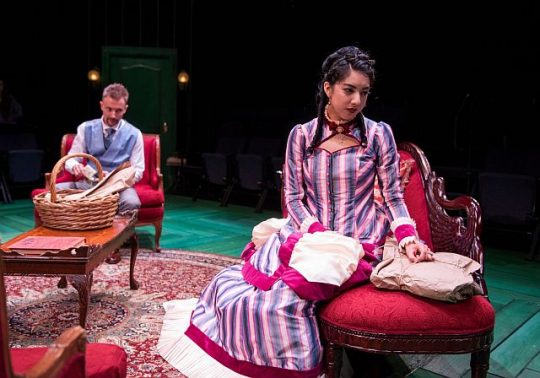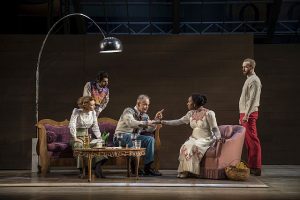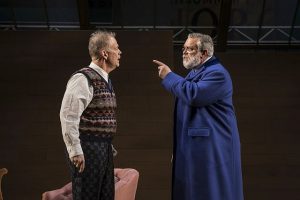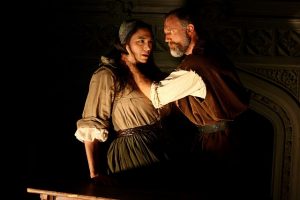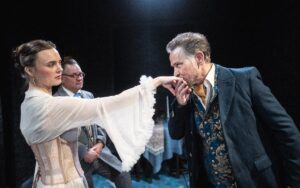
Brookelyn Hébert, John Mossman, (Photo by Joe Mazza/Brave Lux).
Recommended
“Hedda Gabler” by Henrik Ibsen is a story of morality, manipulation and despair. Presented by Artistic Home at The Den Theater, it is a well-crafted story by one of the most influential playwrights of all time.
In “Hedda Gabler” Ibsen gives us a well-crafted story in two hours that reveals the inadvertent dangers of social pressure and a lifetime of pain. The primary themes on a macro level are morality and propriety. On an individual level we find manipulation and despair. It reaches its logical conclusion through events over roughly 48 hours.
Hedda Gabler (Brookelyn Hebert), is the self-absorbed, only daughter of a military officer. She has a grandiose sense of her own importance and a lack of empathy for others.
She feels trapped in a world of bourgeois values full of expectations she cannot control. It is her perception that the men around her seem to enjoy much more freedom to pursue their own public and private interests with less scrutiny and fewer consequences.
This is not entirely true however. Ejlert Lovborg (Dan Evashevsi) is the opposite side of the same coin. He is a gifted writer and deep thinker plagued by alcoholism with a penchant for uncontrollable debauchery. His reputation makes him prone to self-loathing. But tales of his exploits are a way for Hedda to vicariously participate in this apparent freedom
When challenged to join in, she retreats to the safety of social norms because she would not be able to bear public scandal and the rejection of society. It is this external pressure and inner conflict that drives her narcissistic behavior.
Her husband, Jorge Tesman (Todd Wojcik), is an academic consumed by his work and lost in a world of his own. Ejlert’s muse, Thea Elvsted (Ariana Lopez), is oblivious to the world around her and acts on her own impulses with little regard as to consequences.
These two are blithe spirits who seem to move more easily through life and Hedda hates them for it.
As a story of morality Judge Brack (John Mossman) should represent the moral high ground. But instead, he reflects the dichotomy and hypocrisy inherent within the illusion of propriety.
On the other hand, Aunt Julie (Lynne Baker) is the picture of the societal ideal. She is nothing but pure love and goodness whose very presence is anathema to Hedd, as Aunt Julie is the reflection of everything Hedda is not.
Though it is a bit of a spoiler, signs in the lobby alert patrons to acts of violence and themes of suicide. Through careful dialogue Ibsen moves us through the events that lead to the ultimate tragic conclusion involving the presence of a pair of dueling pistols.
Some see this as a story of sexual repression and changing values which is true, but Ibsen poses another question that is unfortunately still relevant today. How culpable is the person who puts a gun in another person’s hand? What is the responsibility of a bully who urges another person to take an action with tragic consequences? Is the narcissist responsible for their own actions or does society bear some of the blame for their feelings of alienation?
Ibsen skillfully walks us through this minefield of emotions and thought-provoking challenges. Directed by Monica Payne, this production featuring Mark O’Rowe’s adaptation, seems to lean a bit more toward a modern interpretation in acting style.
For the most part, the characters lacked a requisite formality toward one another that is representative of the repressed attitudes of the time. It is this very formal behavior that illustrates the level to which the greater society interjects itself into even the private lives of individuals.
It is partly this formality that Hedda finds so oppressive. Its presence is important to fully experience the level of Hedda’s rebelliousness. It is also important for it to be obvious in order to provide a contrast that will allow the audience to fully appreciate the times when people let their guard down and begin communicating more intimately.
I could sense that the actors had internalized this idea but it was not being overtly or physically expressed. This is a period piece that deserves a sincere reflection of the behaviors and nuances of the times, especially since it is integral to the message.
Rachel Lambert’s costumes regarding the ladies’ dresses were very nice and added to the period ambience. The striking set design of Kevin Hagan provided the right mood in terms of time and place. The deep blue monochromatic coloring seemed luxurious and lush. The diminishing concentric panels that framed the space lent a feeling of claustrophobia that enhanced Hedda’s feeling of being trapped. The repetitive nature initially made me think of a house of mirrors that gives you an uneasy feeling of infinite sameness and unknown escape.
If you are a lover of classic theater interested in experiencing an excellent story written by a master playwright this production offers a rare opportunity.
Details: Ibsen’s “Hedda Gabler” presented by Artistic Home is at The Den Theater 1331 N. Milwaukee Ave., Chicago through March 23, 2025. Tickets available at www.thedentheatre.com, or by phone at (773) 697-3830. More information at www.theartistichome.org
Reno Lovison
For more shows visit Theatre In Chicago

